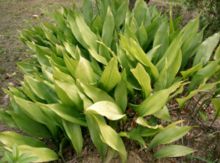Aspidistra elatior
| Aspidistra elatior | |
|---|---|
 |
|
| Scientific classification | |
| Kingdom: | Plantae |
| Clade: | Angiosperms |
| Clade: | Monocots |
| Order: | Asparagales |
| Family: | Asparagaceae |
| Subfamily: | Nolinoideae |
| Genus: | Aspidistra |
| Species: | A. elatior |
| Binomial name | |
|
Aspidistra elatior Blume |
|
| Synonyms | |
|
|
Aspidistra elatior, the cast-iron-plant or bar room plant, also known in Japanese as haran or baran (葉蘭) is a species of flowering plant in the family Asparagaceae, native to Japan and Taiwan. Tolerant of neglect, it is widely cultivated as a houseplant, but can also be grown outside in shade where temperatures remain above −5 °C (23 °F).
Growing to 60 cm (24 in) tall and wide, it is an evergreen rhizomatous perennial, with glossy dark green leaves 30–50 cm (12–20 in) long, and fleshy, 8-lobed cream flowers with maroon colouring on the inner surface, borne in early summer.
Although sometimes thought to be of Chinese origin, the species is in fact native to Taiwan and islands in southern Japan including Kuroshima,Suwanosejima and the Uji Islands. It occurs in association with overstorey species such as Ardisia sieboldii and Castanopsis sieboldii.
Aspidistra elatior is well known in cultivation and has a reputation for withstanding neglect, giving rise to its common name of cast-iron plant. It is tolerant of low light, low humidity, temperature fluctuation and irregular watering. It is best situated in a position away from direct sun to avoid leaf bleaching. Good drainage is also required for optimal growth and to avoid root rot. Widely grown as a house plant, it can also be grown successfully outdoors in shade in temperate climates, where plants will generally cope with temperatures down to −5 °C (23 °F), being killed by frosts of −5 to −10 °C (23 to 14 °F) or below.
The species is not seriously troubled by insects, but mites and scale may cause occasional problems. Its leaves and roots may be subject to browsing by hoofed mammals such as deer, as well as rodents and rabbits.
This plant has gained the Royal Horticultural Society's Award of Garden Merit.
A number of cultivars are available, including:
...
Wikipedia
